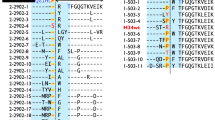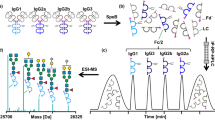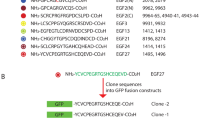Abstract
WE have described the recognition of two conformational forms of γG immunoglobulin, distinguished by their differing susceptibility to proteolysis by papain in the absence of cysteine1,2. Myeloma γG globulins from different individuals were similarly characterized as sensitive or resistant to papain cleavage in these conditions. We report now (a) the results of papain sensitivity studies on myeloma proteins of the four known γG chain sub-classes; (b) the immunological relationship between the papain sensitive and resistant forms of normal γG immunoglobulin and these myeloma proteins; and (c) the carbohydrate composition of myeloma proteins of each sub-class. These studies show that it is only the γG1 and γG3 sub-class population of normal γG immunoglobulin which undergo papain proteolysis in the absence of cysteine. Susceptibility to cleavage by papain can thus be used for the preliminary assignment of myeloma proteins to the γG1, γG3, or γG2, γG4, sub-classes. Furthermore, γG2 and γG4 myeloma proteins can be distinguished from each other by their behaviour on incubation with papain in the presence of cysteine (at 37° C, for 4 h). Proteins of the latter sub-class are completely digested to Fab and Fc fragments in these conditions, whereas those of the former undergo only 10–20 per cent digestion.
This is a preview of subscription content, access via your institution
Access options
Subscribe to this journal
Receive 51 print issues and online access
$199.00 per year
only $3.90 per issue
Buy this article
- Purchase on Springer Link
- Instant access to full article PDF
Prices may be subject to local taxes which are calculated during checkout
Similar content being viewed by others
References
Gergely, J., Stanworth, D. R., Jefferis, R., Normansell, D. E., Henney, C. S., and Pardoe, G. I., Immunochemistry, 4, 101 (1967).
Jefferis, R., and Stanworth, D. R., Nature, 215, 276 (1967).
Franklin, E. C., and Prelli, F., J. Clin. Invest., 39, 1933 (1960).
Dvorak, H. F., Billote, J. B., McCarthy, J. S., and Flax, M. H., J. Immunology, 94, 966 (1965).
Henney, C. S., Ishizaka, K., Proc. Soc. Exp. Biol. and Med., 125, 335 (1967).
Stanworth, D. R., Nature, 188, 156 (1960).
Grey, H. M., and Kunkel, H. G., J. Exp. Med., 120, 253 (1964).
Yount, W. J., Kunkel, H. G., and Litwin, S. D., J. Exp. Med., 125, 177 (1967).
Goodman, J. W., Biochemistry, 4, 177 (1967).
Fahey, J. L., and Horbett, A. R., J. Biol. Chem., 234, 2645 (1959).
Schultze, H. E., Deutsch. Med. Woch., 83, 1742 (1958).
Smyth, D. S., and Utsumi, S., Nature, 210, 332 (1967).
Utsumi, S., and Karush, F., Biochemistry, 4, 1766 (1965).
Author information
Authors and Affiliations
Rights and permissions
About this article
Cite this article
JEFFERIS, R., WESTON, P., STANWORTH, D. et al. Relationship between the Papain Sensitivity of Human γG Immunoglobulins and their Heavy Chain Subclass. Nature 219, 646–649 (1968). https://doi.org/10.1038/219646b0
Received:
Revised:
Issue Date:
DOI: https://doi.org/10.1038/219646b0
This article is cited by
-
Immunoreactivity of125I-papain labelled by different methods
Journal of Radioanalytical and Nuclear Chemistry Letters (1984)
-
Immunochemical aspects of human IgG4
Clinical Reviews in Allergy (1983)
-
A monoclonal mouse antiallotype antibody reacts with certain human and other vertebrate immunoglobulins: Genetic and phylogenetic findings
Immunogenetics (1981)
-
Structural studies of a human hybrid immunoglobulin
Immunogenetics (1974)
-
Degradation of IgG3 monoclonal proteins during storage and in the presence of a thiol (dl-penicillamine)
Experientia (1971)
Comments
By submitting a comment you agree to abide by our Terms and Community Guidelines. If you find something abusive or that does not comply with our terms or guidelines please flag it as inappropriate.



